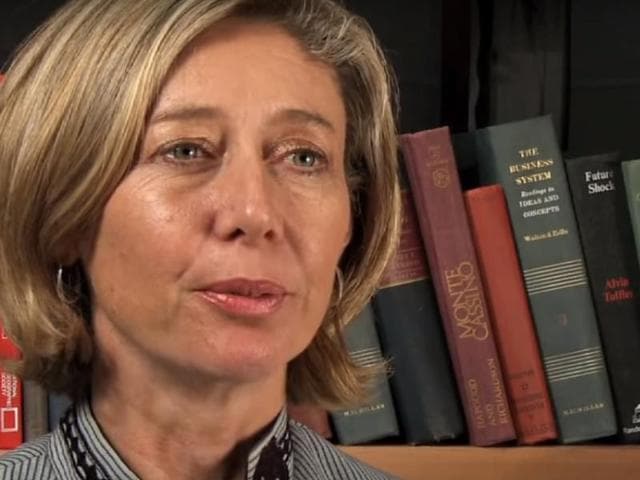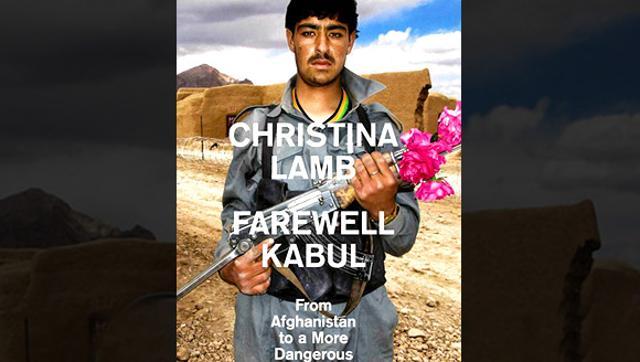Need to learn how vacuum in Iraq created ISIS: Christina Lamb
War correspondent and author Christina Lamb says the West fought the war in Afghanistan with its hands tied, and turned a blind eye as the Taliban enemy was helped by ally Pakistan.
Winner of the Prix Bayeux, Europe’s most prestigious award for war correspondents, Christina Lamb, who is currently Foreign Affairs Correspondent for the Sunday Times, started out in Peshawar with dispatches on the Afghan mujahideen fighting the Russians. Here, Lamb speaks to HT about her new book, Farewell Kabul, From Afghanistan to a More Dangerous World, and her experiences as a war correspondent.

What is Farewell Kabul… about?
The book draws on my 28 years of reporting experience from Afghanistan and Pakistan. I am unusual in the sense that I started covering the region when the Afghan mujahideen were fighting the Russians. Since then, I have reported from Afghanistan, Pakistan, Washington and London. I have interacted with all the key decision makers in these countries including heads of states and generals, as well as soldiers on the ground.
I am passionate about Afghanistan. The main question that I seek to answer in the book is whether the war that started post 9/11 (the western involvement) was worth the money and the lives lost. The book tells how success was turned into a defeat in the longest war fought by the US in its history and by Britain since the Hundred Years War. The fiasco has left Afghanistan one of the poorest places on earth, the Taliban undefeated, and nuclear-armed Pakistan perhaps the most dangerous place on earth.
Read: 12 authors to look out for at Jaipur fest at JLF 2016
Did you always want to become a war correspondent?
I never set out to be war correspondent. I wanted to be a novelist. I wanted to travel. I was in Financial Times and was sent to interview Benazir Bhutto and later got an invite to be at her wedding. I became interested in Pakistan and wanted to report from there but editors in London thought there was not much interest in the country and so packed me off to Afghanistan. I was 21.
There is a lot on Pakistan in the book. How do you see their role after 2001?
Initially, the focus was not on Pakistan. This was a mistake since the safe havens were there. At the beginning Pakistan did cooperate, but after the US President Bush’s “You’re either with us, or against us” statement, they started seeing the US as an adversary. The problem is that Americans see everything in black and white and Pakistanis see shades of grey. But on the other hand, I completely understand Pakistan’s stand. After the Russians exited Afghanistan, everybody just moved out and abandoned Pakistan. There were sanctions on them. That has been imprinted on Pakistan’s institutional memory. The US has to understand that.

How has Afghanistan changed since 2001?
Unfortunately, the situation in Afghanistan has deteriorated. When the western troops left, I thought it would go either way but then, last year, the death toll was the highest since 2001. The Afghan army knows how to fight but is not motivated enough. Unlike the western forces, they don’t have the enablers: air support, medical support and ground-level intelligence to take on the opponents. Even their supply chain is not fixed. What I really feel angry about is the status of women. I have met women who had been made role models by the West and were then shot, raped or forced to flee the country.
Read: Salman Rushdie to Ashis Nandy... when JLF hit a wrong note
You know both Hamid Karzai and Ashraf Ghani…
Yes, I do. Karzai I thought was a wrong choice because he had never run anything. But I must admit that anyone would have found it difficult to run the country. He did not have an army… but yes, he did manage to keep the country together. Personally he was not corrupt but his government was. Ghani is sharing power with Abdullah Abdullah and the latter has no interest in Ghani succeeding for obvious reasons. They have good personal equation but many in their staff cannot work with each other. The other problem is that Ghani’s US-style of administration may not work in Afghanistan.
With ISIS on the rampage, is the focus of the world shifting from Afghanistan?
I am afraid it is. But the war is not over in Afghanistan. It is not yesterday’s war. If we move away from Afghanistan, it would be so unfair on the people of the country and all those who sacrificed their lives there. The media has an important job to remind the government that it is an unfinished agenda. We must learn a lesson from Iraq -- how the vacuum created ISIS.
Where did the West go wrong in Afghanistan?
While Afghanistan needed elections and gender parity and other such things, they also needed food, security. But we often don’t listen to local people. The lesson here is that while military intervention may be necessary, the West must ask the local people what they want and think about the long-term future of the people and the country. Additionally, as the book reveals, the West fought the war with its hands tied, committed too little too late, failed to understand the local dynamics, and turned a blind eye as the Taliban enemy was helped by ally Pakistan.





